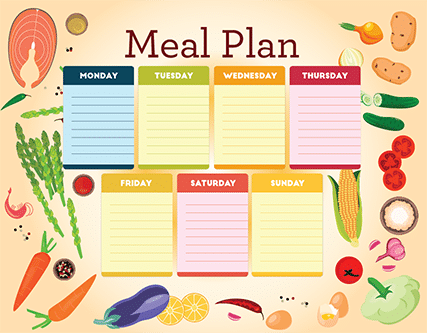In the hustle and bustle of modern life, maintaining a healthy diet can often feel like a daunting task. However, one powerful tool stands out as a cornerstone for success in achieving and sustaining optimal health
Meal planning. By taking the time to thoughtfully plan meals in advance, individuals can significantly improve their nutritional intake, manage portion sizes, save time and money, and ultimately foster long-term well-being.

Nutritional Balance and Variety. Meal planning allows individuals to ensure that their meals are well-balanced and contain a variety of nutrients essential for overall health. By carefully selecting a combination of lean proteins, whole grains, fruits, vegetables, and healthy fats, individuals can meet their daily nutritional needs and prevent deficiencies. Planning meals also provides an opportunity to incorporate a diverse range of foods, promoting greater enjoyment and satisfaction with eating while expanding one’s palate.
Portion Control and Calorie Management. One of the challenges of maintaining a healthy weight and preventing overeating is managing portion sizes. Meal planning enables individuals to control portion sizes by pre-determining the amount of food they will consume for each meal and snack. By portioning out meals in advance, individuals can avoid mindless eating and better adhere to recommended serving sizes, thereby supporting weight management goals and preventing unnecessary calorie consumption.

Time Efficiency and Convenience. In today’s fast-paced world, time is a precious commodity. Meal planning offers a solution by streamlining the cooking process and reducing the need for last-minute decision-making. By dedicating a specific time each week to plan meals, create shopping lists, and prep ingredients, individuals can save valuable time during busy weekdays. Additionally, prepping meals in advance allows for quick and convenient access to healthy options, reducing the temptation to rely on fast food or unhealthy convenience foods when pressed for time.
Financial Savings. Contrary to popular belief, eating healthily does not have to break the bank. In fact, meal planning can be a cost-effective strategy for managing food expenses. By planning meals in advance and making a grocery list based on weekly menus, individuals can minimize food waste, avoid impulse purchases, and take advantage of sales and discounts. Additionally, preparing meals at home tends to be more economical than dining out or ordering takeout, resulting in significant savings over time.

Long-Term Health Benefits. Beyond the immediate advantages of improved nutrition and time savings, meal planning offers a multitude of long-term health benefits. Research has consistently shown that individuals who engage in regular meal planning are more likely to adhere to healthy eating patterns, achieve and maintain a healthy weight, and reduce their risk of chronic diseases such as obesity, diabetes, and heart disease. By fostering a proactive approach to nutrition, meal planning empowers individuals to take control of their health and well-being, laying the foundation for a lifetime of good habits.
In summary, meal planning is a powerful tool for promoting health and nutrition in today’s busy world. By prioritizing nutritional balance, portion control, time efficiency, and financial savings, individuals can harness the benefits of meal planning to support their wellness goals and improve their overall quality of life. Whether you’re a busy professional, a parent juggling multiple responsibilities, or someone looking to enhance their health and vitality, integrating meal planning into your routine can be a transformative step towards a healthier, happier you.




